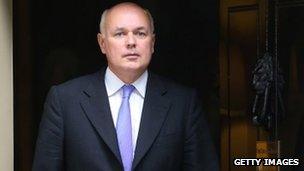IDS cooks up an alphabet soup
- Published

Iain Duncan Smith has defended the benefits reforms
Did you catch IDS on GMS talking about DLA, ESA, IB, PIP, HBOS, RBS and the SNP?* Fascinating, wasn't it?
OK, enough of the alphabet soup.
The work and pensions secretary, Iain Duncan Smith, was being pressed by my estimable colleague Gary Robertson anent his benefits reforms and sundry related matters (catch it online if you missed it on the wireless: it's a good listen).
Gary repeatedly referred to the evidence given to MSPs by claimants with disabilities to the effect that the system degraded them - and left them short of cash.
In response, IDS repeatedly argued that reforms had been introduced in order to target support more effectively and to get folk back into work, if at all possible.
But why were MSPs investigating this issue at all, given that welfare is reserved to Westminster?
Lack of control
Broadly, three reasons. Firstly, there is authentic concern at the knock-on impact of benefit changes upon services which are devolved to Scotland, such as social care.
Secondly, though, there is politics: Scotland's two largest parties, the SNP and Labour, welcome the chance to give the coalition parties a kicking over the benefit changes, arguing that they will disadvantage the poor (the Tories and LibDems dissent, insisting that those in genuine need will still receive substantial assistance).
But there is a third element: the ever-present factor in contemporary Scottish politics. The SNP are citing Holyrood's lack of control over welfare as evidence of the need for more powers and, indeed, independence.

Claimants with disabilities have spoken out against changes to the system
In addition, the Nationalists are preparing an advance rebuttal for an argument which IDS was already setting out to make on the wireless this morning.
His case was that you require a large polity and a large economy like the UK in order to operate an effective redistribution system whereby resources are transferred from the relatively wealthy to the relatively poor. A family, as he described it.
In essence, this is the same broad case that formed a core part of the Calman Commission report - which talked of uniform social welfare as an object of the UK.
It is also the case adduced by, for example, Labour's Johann Lamont in her party conference speech in Dundee.
Once again, it is sufficient for those defending the Union to attempt to sow doubt in the minds of the voters. Could Scotland afford welfare? Could Scotland afford to protect the poorest?
This is where my third discernible element comes in. As well as offering vigorous assurance on these points, the Nationalists are seeking, legitimately from their standpoint, to argue that UK governance can, palpably, not be trusted to deliver a welfare system which is fit for purpose.
Strengthen grip
One can hear a similar argument from Alex Salmond with regard to the changes being introduced in the NHS in England.
Be afraid, he argues. Turn to independence to entrench the NHS in Scotland. Ditto university tuition fees. Not until the rocks melt wi' the sun.
Once again, the core debate is: doubt versus reassurance.
PS: On the subject of Ms Lamont, it is intriguing to note that she is attempting to strengthen her grip upon the machinery of the party in Scotland - which she now leads, the remit having been extended beyond Holyrood.
To be fair, she said upon election that she regarded reform of the internal party machinery as crucial.
One change that has been little noted is that the building blocks of Labour's structure will in future be Holyrood constituencies, rather than Westminster ones.
Indeed, that change is under way right now with the new local parties meeting to regroup. Likely to have a psychological impact in that it will mean the fundamental focus of the party, structurally, is upon Holyrood.
* For the pedants, worthy band that we are, the initials stand for Iain Duncan Smith; Good Morning Scotland; Disability Living Allowance; Employment and Support Allowance; Incapacity Benefit; Personal Independence Payment; Halifax Bank of Scotland; Royal Bank of Scotland; Scottish National Party. But then you already knew that, didn't you? Pip, pip!
- Published18 September 2012
